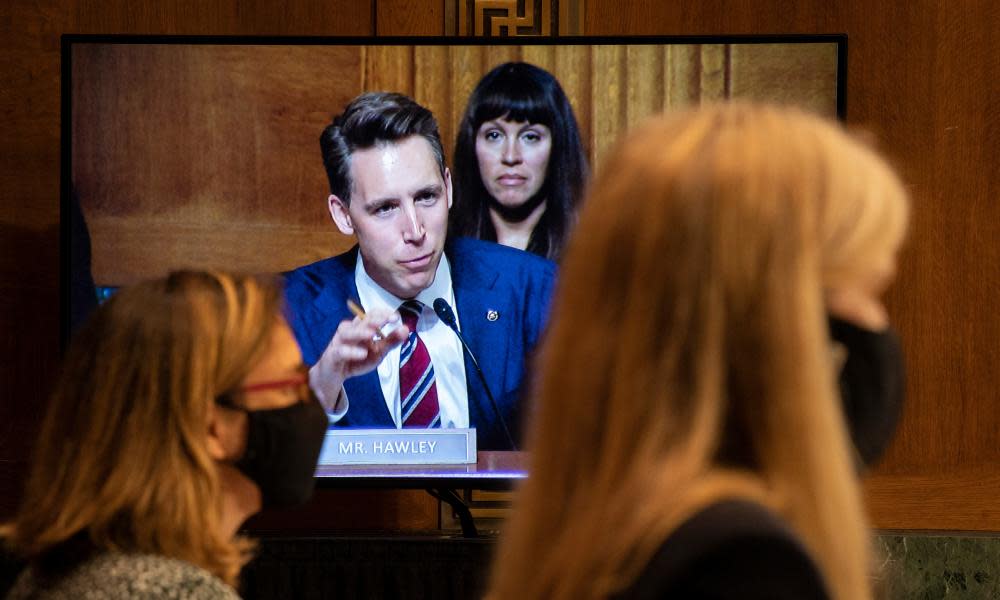Has Mark Zuckerberg’s total control of Facebook turned into a liability?

For devotees of C-Span, the public-service media network that covers the US Congress, Tuesday was an interesting day. The Senate judiciary subcommittee on competition policy, antitrust and consumer rights held a hearing on the social media companies, which for most purposes meant Google and Facebook. It was intriguing in several ways. For one thing, the senators were exercised, sceptical and sometimes angered by the evasive cant served up by the corporate executives whom they had summoned. More importantly, the perceptible anger was bipartisan (a rare thing in the current Congress). And lastly, some of the most aggressive questioning of the hapless Facebook representative came from Senator Josh Hawley of Missouri, who is believed to be PayPal co-founder Peter Thiel’s preferred candidate for president in 2024. And Thiel is a member of Facebook’s board of directors!
This congressional ire was triggered by a terrific scoop in the Wall Street Journal, which had got its hands on a trove of internal Facebook documents. These exposed the yawning chasm between Facebook’s public versions of its stance on various contentious issues and its internal discussions of them. Specifically, the trove showed that: at least 5.8 million high-profile users had been allowed to avoid the company’s normal enforcement processes; research by Instagram (owned by Facebook) had revealed the risk the platform poses to teenagers’ mental health (“We make body image issues worse for one in three teen girls” was one striking phrase); the company knew that its algorithms rewarded outrage; and it had been slow to stop drug cartels and human traffickers from using its platform.
These revelations were so stark that they even moved Facebook’s preposterous oversight board to publish a blog post on the matter. “In light of recent developments,” it bleated, “we are looking into the degree to which Facebook has been fully forthcoming in its responses in relation to cross-check, including the practice of whitelisting. The board has reached out to Facebook to request they provide further clarity about the information previously shared with us. We expect to receive a briefing from Facebook in the coming days…” Note the words “request”, “expect” and “further clarity”, which provide a neat illustration of the mendicant status of this ludicrous, virtue-signalling outfit.
Facebook is one of the most toxic corporations on the planet. Its toxicity has two roots. The first is its business model: intrusive and comprehensive surveillance of its users in order to compile profiles that enable advertisers to target messages at them. This business model is powered by the machine-learning algorithms that construct those profiles and determine what appears in the news feeds of the company’s 2.85 billion users. In large measure, it is the output of these algorithms that constitutes the focus of congressional anger and inquiry.
The other source of the company’s toxicity is its governance. Essentially, Facebook is a dictatorship entirely controlled by its founder, Mark Zuckerberg. This total control is ensured by a two-tier share ownership structure that gives him untrammelled power. The company’s regular regulatory filings describe it thus: “Mark Zuckerberg, our founder, chairman and CEO, is able to exercise voting rights with respect to a majority of the voting power of our outstanding capital stock and therefore has the ability to control the outcome of matters submitted to our stockholders for approval, including the election of directors and any merger, consolidation or sale of all or substantially all of our assets. This concentrated control could delay, defer, or prevent a change of control, merger, consolidation or sale of all or substantially all of our assets that our other stockholders support, or conversely this concentrated control could result in the consummation of such a transaction that our other stockholders do not support.”
Of course Facebook does have a board of directors, but they have as much agency as the ethics committee of an arms manufacturer. They are all appointed by Zuckerberg and serve at his pleasure and are thus, ultimately, his creatures. The significance of this subservience has been under-appreciated to date, but has just been dramatically highlighted by a lawsuit, filed in Delaware by the State of Rhode Island’s pension fund, which names all the members of the board as plaintiffs.
The background is that in 2020 the US Federal Trade Commission (FTC) ruled that Facebook had violated a “consent decree” about protecting users’ privacy that it had entered into in 2012 after the Cambridge Analytica scandal. The envisaged fine – $5bn – was huge and the commission held Zuckerberg as the guilty party, on account of his total control of the company. But the Facebook board of directors resisted, arguing that it was a company responsibility, not Zuckerberg’s, and accepted the fine as a corporate liability, thus saving the boss $5bn. As stockholders, the pension fund is not amused by this piece of chicanery and the casual appropriation of shareholders’ funds; hopefully, one the day the court will not be either. Stay tuned.
What I’ve been reading
There and back again
CS Lewis’s 1937 review of The Hobbit. From the Times Literary Supplement of 2 October 1937, courtesy of Literary Hub.
The wages of destruction
A long, thoughtful blog post by Adam Tooze about the challenge for a historian writing about (and trying to make sense of) continuing events.
Shock and awe
9/11 Was a Warning of What Was to Come is a characteristically insightful reflection by George Packer in the Atlantic on the 9/11 attacks. It was the first sign that the 21st century would be a period of shock and disaster.

 Yahoo Movies
Yahoo Movies 
